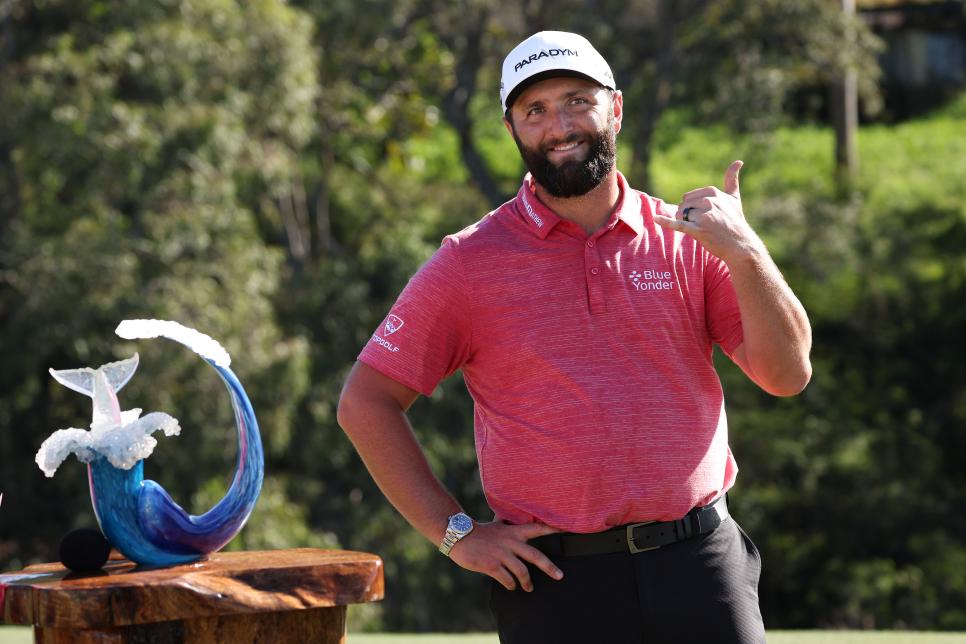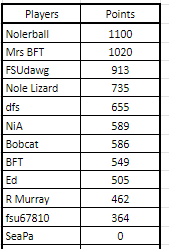Twenty-one of the top 25 players in the Official World Golf Ranking will competing in the no-cut event with an overall prize money payout of $20 million.
In addition to McIlroy, the tournament will also be missing its defending champion, Jon Rahm, who rallied from eight strokes back with 17 holes to play in the final round a year ago to win the title by two over Collin Morikawa. The Spaniard, of course, made waves last month when he signed with the LIV Golf League in 2024.

Harry How
Given that the first LIV event wasn’t until February, questions arose as to whether Rahm might still be able to compete at The Sentry and the American Express later in January, another tournament in which he claimed the title. PGA Tour officials quickly squashed that notion, suspending Rahm from the tour and updating the FedEx Cup rankings from 2023 to take him out of his No. 18 spot and move all others up accordingly. That allowed Mackenzie Hughes to move from 51st to 50th and gain entry into this coming week’s event and all other 2024 signature events.
Here's the complete field playing in Maui:
Akshay Bhatia
Keegan Bradley
Sam Burns
Wyndham Clark
Corey Conners
Jason Day
Nico Echavarria
Tony Finau
Matt Fitzpatrick
Rickie Fowler
Lucas Glover
Emiliano Grillo
Nick Hardy
Brian Harman
Lee Hodges
Max Homa
Viktor Hovland
Si Woo Kim
Tom Kim
Chris Kirk
Kurt Kitayama
Luke List
Taylor Moore
Collin Morikawa
Vincent Norrman
Davis Riley
Justin Rose
Scottie Scheffler
Sepp Straka
Nick Taylor
Sahith Theegala
Erik van Rooyen
Camilo Villegas
Matt Wallace

PUBLIC
202PANELISTS
From Golf Digest Architecture Editor emeritus Ron Whitten:Most golf fans are familiar with Kapalua Golf Club’s Plantation Course, home of the PGA Tour's opening event each year. Located on the north shore of the Hawaiian island of Maui, the Plantation was built from open, windswept pineapple fields on the pronounced slope of a volcano and is irrigated by sprinklers pressured solely by gravity. As the first design collaboration by Bill Coore and Ben Crenshaw, it unveiled their joint admiration for old-style courses. The blind drive on the fourth, the cut-the-corner drives on the fifth and sixth are all based on tee shots found at National Golf Links. So, too, are its punchbowl green and strings of diagonal bunkers. It's also a massive course, built on a huge scale, Coore says, to accommodate the wind and the slope and the fact that it gets mostly resort play.So it's a big course. But what sets it apart in my mind are the little things. When I played the course years ago with Coore, it took only one hole for me to appreciate one of its subtleties. We were on the tee of the par-3 second, an OK hole but nothing riveting, nothing like the canyon-carry par-3 eighth or the ocean-backdropped par-3 11th. The second sits on a rare flat portion of the property. The green sits at a diagonal, angling left to right, and there's a string of bunkers staggering up the right side of the green. The first bunker appears to be directly in front of the green but is actually 40 yards short of it. When pointed out to me, I called it Gingerbread. Bill disagreed."The wind quarters off your left shoulder from behind you," he pointed out. "The green goes ever so slightly away from you from front to back and left to right. It is a very obvious situation, given the wind condition and the angle of this green; you know you should hit a shot left-to-right to fit the shot with the green. "But if the flag is at the front, there’s no way to fly that ball all the way to the hole and stop it close. You may stop it somewhere on the green, but nowhere within a reasonable putt. So you have to aim short of the green. They maintain the approaches so beautifully over here—firm approaches mowed at probably a quarter of an inch; you can literally putt from out there if you chose to do so. "But that brings that first bunker in play," Coore continued. "When the flag is up front, you are absolutely required to land your ball just over that first bunker in order to get it to bounce and run to that front pin position."Kapalua's second is a simple-looking hole with a great deal of thought behind it. I suppose a lot of present-day architects would not have placed that forwardmost bunker on the hole, in the interests of playability for high-handicap resort golfers. But most of the old-time architects probably would have used such carry bunkers, especially in the days before irrigation, when greens were hard as a rock and every approach shot had to be bounced aboard.Another reason why studying the history of architecture might just help your score.
VIEW COURSE
Tommy Fleetwood
Russell Henley
Xander Schauffele
Sungjae Im
Adam Schenk
Tyrrell Hatton
Jordan Spieth
Denny McCarthy
Andrew Putnam
Adam Svensson
Harris English
J.T. Poston
Seamus Power
Cameron Young
Eric Cole
Byeong Hun An
Adam Hadwin
Tom Hoge
Brendon Todd
Cam Davis
Patrick Rodgers
Mackenzie Hughes
Hideki Matsuyama
In addition to McIlroy, the tournament will also be missing its defending champion, Jon Rahm, who rallied from eight strokes back with 17 holes to play in the final round a year ago to win the title by two over Collin Morikawa. The Spaniard, of course, made waves last month when he signed with the LIV Golf League in 2024.

Harry How
Given that the first LIV event wasn’t until February, questions arose as to whether Rahm might still be able to compete at The Sentry and the American Express later in January, another tournament in which he claimed the title. PGA Tour officials quickly squashed that notion, suspending Rahm from the tour and updating the FedEx Cup rankings from 2023 to take him out of his No. 18 spot and move all others up accordingly. That allowed Mackenzie Hughes to move from 51st to 50th and gain entry into this coming week’s event and all other 2024 signature events.
Here's the complete field playing in Maui:
PGA Tour winners in 2023
Ludvig ÅbergAkshay Bhatia
Keegan Bradley
Sam Burns
Wyndham Clark
Corey Conners
Jason Day
Nico Echavarria
Tony Finau
Matt Fitzpatrick
Rickie Fowler
Lucas Glover
Emiliano Grillo
Nick Hardy
Brian Harman
Lee Hodges
Max Homa
Viktor Hovland
Si Woo Kim
Tom Kim
Chris Kirk
Kurt Kitayama
Luke List
Taylor Moore
Collin Morikawa
Vincent Norrman
Davis Riley
Justin Rose
Scottie Scheffler
Sepp Straka
Nick Taylor
Sahith Theegala
Erik van Rooyen
Camilo Villegas
Matt Wallace

PUBLIC
Kapalua: Plantation
Lahaina, HI
202PANELISTS
From Golf Digest Architecture Editor emeritus Ron Whitten:Most golf fans are familiar with Kapalua Golf Club’s Plantation Course, home of the PGA Tour's opening event each year. Located on the north shore of the Hawaiian island of Maui, the Plantation was built from open, windswept pineapple fields on the pronounced slope of a volcano and is irrigated by sprinklers pressured solely by gravity. As the first design collaboration by Bill Coore and Ben Crenshaw, it unveiled their joint admiration for old-style courses. The blind drive on the fourth, the cut-the-corner drives on the fifth and sixth are all based on tee shots found at National Golf Links. So, too, are its punchbowl green and strings of diagonal bunkers. It's also a massive course, built on a huge scale, Coore says, to accommodate the wind and the slope and the fact that it gets mostly resort play.So it's a big course. But what sets it apart in my mind are the little things. When I played the course years ago with Coore, it took only one hole for me to appreciate one of its subtleties. We were on the tee of the par-3 second, an OK hole but nothing riveting, nothing like the canyon-carry par-3 eighth or the ocean-backdropped par-3 11th. The second sits on a rare flat portion of the property. The green sits at a diagonal, angling left to right, and there's a string of bunkers staggering up the right side of the green. The first bunker appears to be directly in front of the green but is actually 40 yards short of it. When pointed out to me, I called it Gingerbread. Bill disagreed."The wind quarters off your left shoulder from behind you," he pointed out. "The green goes ever so slightly away from you from front to back and left to right. It is a very obvious situation, given the wind condition and the angle of this green; you know you should hit a shot left-to-right to fit the shot with the green. "But if the flag is at the front, there’s no way to fly that ball all the way to the hole and stop it close. You may stop it somewhere on the green, but nowhere within a reasonable putt. So you have to aim short of the green. They maintain the approaches so beautifully over here—firm approaches mowed at probably a quarter of an inch; you can literally putt from out there if you chose to do so. "But that brings that first bunker in play," Coore continued. "When the flag is up front, you are absolutely required to land your ball just over that first bunker in order to get it to bounce and run to that front pin position."Kapalua's second is a simple-looking hole with a great deal of thought behind it. I suppose a lot of present-day architects would not have placed that forwardmost bunker on the hole, in the interests of playability for high-handicap resort golfers. But most of the old-time architects probably would have used such carry bunkers, especially in the days before irrigation, when greens were hard as a rock and every approach shot had to be bounced aboard.Another reason why studying the history of architecture might just help your score.
VIEW COURSE
Top 50 on prior season's FedEx Cup
Patrick CantlayTommy Fleetwood
Russell Henley
Xander Schauffele
Sungjae Im
Adam Schenk
Tyrrell Hatton
Jordan Spieth
Denny McCarthy
Andrew Putnam
Adam Svensson
Harris English
J.T. Poston
Seamus Power
Cameron Young
Eric Cole
Byeong Hun An
Adam Hadwin
Tom Hoge
Brendon Todd
Cam Davis
Patrick Rodgers
Mackenzie Hughes
Hideki Matsuyama

